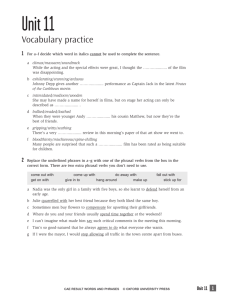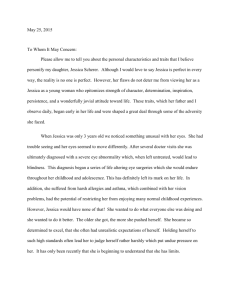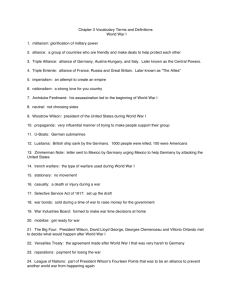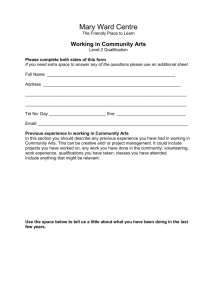notes & actions 9th February 2015 meeting
advertisement
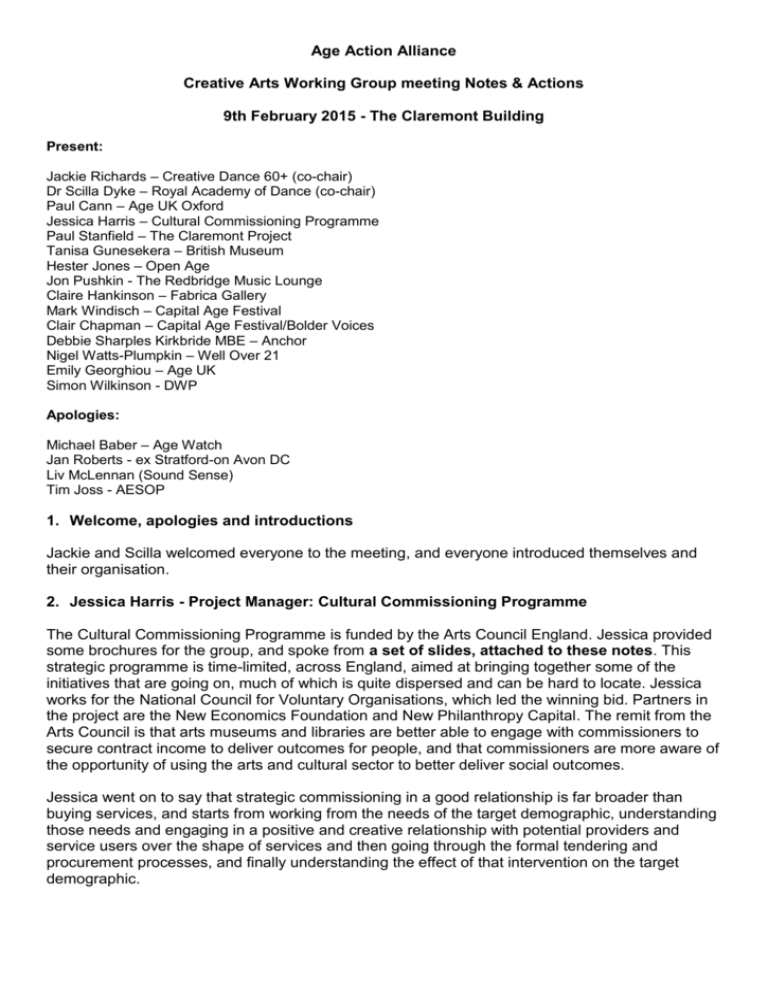
Age Action Alliance Creative Arts Working Group meeting Notes & Actions 9th February 2015 - The Claremont Building Present: Jackie Richards – Creative Dance 60+ (co-chair) Dr Scilla Dyke – Royal Academy of Dance (co-chair) Paul Cann – Age UK Oxford Jessica Harris – Cultural Commissioning Programme Paul Stanfield – The Claremont Project Tanisa Gunesekera – British Museum Hester Jones – Open Age Jon Pushkin - The Redbridge Music Lounge Claire Hankinson – Fabrica Gallery Mark Windisch – Capital Age Festival Clair Chapman – Capital Age Festival/Bolder Voices Debbie Sharples Kirkbride MBE – Anchor Nigel Watts-Plumpkin – Well Over 21 Emily Georghiou – Age UK Simon Wilkinson - DWP Apologies: Michael Baber – Age Watch Jan Roberts - ex Stratford-on Avon DC Liv McLennan (Sound Sense) Tim Joss - AESOP 1. Welcome, apologies and introductions Jackie and Scilla welcomed everyone to the meeting, and everyone introduced themselves and their organisation. 2. Jessica Harris - Project Manager: Cultural Commissioning Programme The Cultural Commissioning Programme is funded by the Arts Council England. Jessica provided some brochures for the group, and spoke from a set of slides, attached to these notes. This strategic programme is time-limited, across England, aimed at bringing together some of the initiatives that are going on, much of which is quite dispersed and can be hard to locate. Jessica works for the National Council for Voluntary Organisations, which led the winning bid. Partners in the project are the New Economics Foundation and New Philanthropy Capital. The remit from the Arts Council is that arts museums and libraries are better able to engage with commissioners to secure contract income to deliver outcomes for people, and that commissioners are more aware of the opportunity of using the arts and cultural sector to better deliver social outcomes. Jessica went on to say that strategic commissioning in a good relationship is far broader than buying services, and starts from working from the needs of the target demographic, understanding those needs and engaging in a positive and creative relationship with potential providers and service users over the shape of services and then going through the formal tendering and procurement processes, and finally understanding the effect of that intervention on the target demographic. The programme has been running for 18 months, and following a research phase met with Arts Council England and identified areas of focus as older people, mental health and wellbeing, and place-based commissioning. The added value that the cultural sector brings is around such things as encouraging sustained participation, working on the preventative agenda, addressing inclusivity, and good at building on exiting community assets. Through the research the challenges for commissioners were identified as the current pressure on budgets to deliver, and the difficulty to evidence preventative-based approaches. Questions/comments Paul Cann – a very important programme, interested in advocacy on the basis of evidence, and how the programme will share that evidence? Jessica – the links to evidence have been collated, and the programme is considering the impact on adult social care, including publishing research on case studies Jon – how to encourage commissioners who are under pressure from budget constraints to look at what a programme will deliver? Jessica – one workstream called Commissioning Partners seeks to shift the culture in this way Emily – how can individuals tap into the programme? Jessica – by attending the learning programme – 2 rounds coming up in London which has spaces on it – check out website: https://www.ncvo.org.uk/practical-support/public-services/cultural-commissioning-programme Jackie – there needs to be partnerships where large and small groups can come together and obtain funding together Scilla – this has to be communicated in a way which plays a political game, captures evidence and presents qualitative data as well. Jessica – there are a variety of ways of working together – might be as a cultural consortium or a with a charity or local CVS Jessica can be contacted at: Jessica.Harris@ncvo.org.uk 3. Age Action Alliance update Simon distributed a set of slides (attached to these notes) - the Age Action Alliance is now over 3 years old and had continued to grow steadily with over 720 members. Recent joiners include EE, Centre for Ageing Better and the Equity Release Council. Simon encouraged the group to send him any blogs they would like posted on the Age Action Alliance website, and referred to Nigel’s recent posting: http://ageactionalliance.org/are-we-too-old-tomake-it-in-music/ Recent practical outcomes include: “Overcoming the barriers to access for older people” - report from the Transport Working Group. Money Advice leaflet” developed by the Money Matters Working Group, which has been in great demand, currently looking for funding for a second print run A second edition of the FirstContact Schemes: Extent & Impact Report was published in July 2014 by the Elderly Accommodation Counsel which surveys the current 35 schemes throughout the country which are looking at ways to link people to local services. An online video allows those interested in developing FirstContact schemes to get an idea of how the schemes work and the issues to be considered when setting up a scheme. The Fuel Poverty and the Living Safely at Home Guides are recent additions to the suite of products being developed by respective working Group. The Alliance is looking to run workshops later this year, training older people to become Energy Efficiency Advocates in their communities. The Digital Inclusion Working Group has been working closely with DCLG on the Government’s blueprint for digital connectivity. The Alliance has also been invited to hosted the Older Workers Employers toolkit in March 2015 The Alliance now has its own Pinterest board - https://www.pinterest.com/AgeActAlliance/ - designed and populated by an Alliance Member and which compliments the Alliance’s Social Media, and the photo gallery is still proving very popular – please send in any photos you would like added to the gallery: http://ageactionalliance.org/galleries/ 4. Paul Cann – promoting the Creative Arts for Older People (Age of Creativity) Age UK Oxfordshire have been running a website called the Age Of Creativity, founded by the Baring Foundation three years ago - http://www.ageofcreativity.co.uk/ - and requested that members develop the site as a vehicle to be of help to everyone involved in the arts, and to make personal contributions to the site. Paul was instrumental in establishing the Campaign to End Loneliness, and went on to say that the Creative Arts were central in taking forward a positive agenda to address loneliness. http://www.campaigntoendloneliness.org/ The concept of the “convoy” which the Campaign used is a useful one, that each person has a convoy around them of family and friends, good health, all of which slowly depletes as we get older. Paul went on to say that he felt that the age sector has neglected the area of the things that make people want to get up in the morning. He would like to see the creative arts hold a more important place in the policy arena. The website presents huge opportunities and he would like to see a community of interest grow across the UK, sharing and learning. The steer of the baring Foundation was towards artsproviding organisations, but the next phase should more directly include older people’s and care organisations. Paul asked the group if a central theme should continue to be the value of evidence and research to enable to make the case for the creative arts? Paul is keen to develop this in partnership across the UK and is trying to develop a UK-wide steering group, and asked the group to help promote and develop the community of interest. Questions/comments Clair – I have found Age UK not particularly arts-friendly – is there a reason for that? Paul – There has been a challenge for Age UK in that we have been pre-occupied with the big policy debates – pensions, health and social care, etc. We need to make the case through evidence about the strength and power of creative arts, including finding a suitable language to use. Scilla commented that the Age of Creativity might be used to find the common language that Paul suggested – what is that language? – and use the case studies and evidence base to argue the case as coherently and concisely as possible Jackie said it was important to offer people a range of activities and experience that will keep them part of their communities. Jackie said that one purpose of the group will be to communicate what is required, and get the strategies right in order that they can be achieved. Action 1 – Paul was invited to write a blog for the Alliance website, providing a summary and setting out the direction. Debbie shared how the power of the arts, particularly music and dance, had enabled her to engage within Anchor in a positive way, securing positive press coverage as well as secure funding as it has taken the arts up a level within the organisation. Debbie referenced the Anchor Community Band, made up of care home residents. 5. Paper from Age UK London - Arts for Older People forum in London – Jon Pushkin Jon explained that the paper he had circulated (attached to these notes) is London-based and reflects a lack of arts focus in age-sector organisations. Age UK London have secured some funding to create a symposium to look at some themes and decide what would be most useful, followed by one or two further meetings. A steering group meeting is planned for 13th March (pm) and Jon asked the group if anyone would like to represent the group. Hester (Open Age) offered to represent the Working Group. Jon mentioned that Damian Hebron, Chief Executive of London Arts and Health sits on the steering group. 6. Clare Hankinson - Winston Churchill Travel Fellowship Claire explained that she had recently interviewed for a position on the Winston Churchill Travel Fellowship with the intention of doing some research abroad how older people and their communities can be empowered specifically contemporary art but also by art in general. Claire hoped that the group wold be interested in the findings and also participate in a survey she hoped to produce to inform what she might look to find out, and if the group could point her towards some best practice. Tanisa – the British Museum is engaged in programmes to develop confidence Jackie – organisations like to display visual arts, and with more older people remaining in work, this might be an opportunity to utilise the skills of their staff to produce something useful to their organisation. 7. “Access to Creative Arts” project: Actions from previous meeting: Paul would research network forums to find out what was already in place and he would look at “Awards for All” grants - Paul explained that at the previous meeting the group had discussed the need for online tools to enable discussion. He advised that he didn’t find very much. He then looked at software that would create the right kind of forum, which is not expensive, the main cost being someone to run it – this is forming the essence of the Awards for All bid, which is in development. Asa (Anchor) and Paul would discuss other possible options Paul will ask his fundraiser to contact Debbie. Once written the Claremont Project will be the lead applicant, with Anchor. If successful, it can be decided how the forum fits in and informs the main part of the project, looking how to provide people with access to the arts, the most important elements of which were making sure people knew about it and making sure they could get there, etc. Jackie would seek advice from Trish Hafford-Letchfield, Middlesex University, who was from the health and social care faculty and had interests in creative arts and older people. Cleared - advice was that if there was funding available the university would be interested to get involved. Mark would feedback to Capital Age Festival to see if someone would like to join the group and attend future meetings. He agreed to speak to John Puskin about potential funding sources. Cleared – (Clair has attended the meeting and invited to join the group) 8. Review of meeting All present felt the meeting had been very worthwhile and valued the opportunity to share within an independent group with the potential to do important national work. Also of value were the opportunities to develop ideas and work in partnership, sharing with others who share the same passion, tapping into different networks. It was also considered important that the group practically achieve something. Next meeting to be have a more practical theme/action-based Jackie thanked everyone for attending and their contribution. 9. Date of next meeting: Monday 18th May 11.00 – 1.00 pm at the Claremont Building
